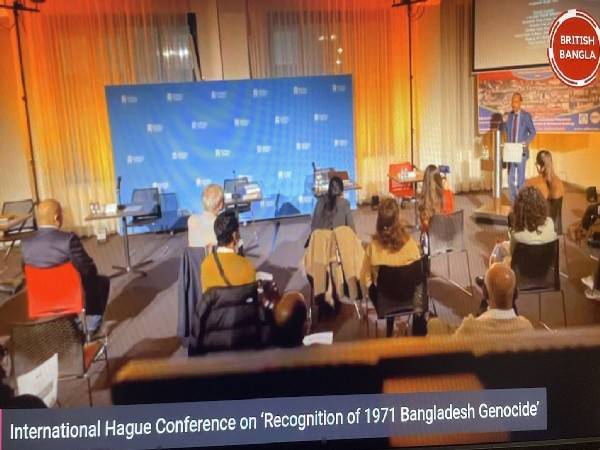It may be mentioned that The Hague conference was the follow-up of the Geneva conference held on the same issue on September 30 at the Geneva Press Club in Switzerland…reports Asian Lite News.
An international conference in The Hague, known as the city of Justice, demanded of the international community to recognise the 1971 Genocide in Bangladesh committed by Pakistan soldiers.
The conference also urged the international community to put pressure on the Pakistan government to offer an unconditional apology to Bangladeshi people for the crime committed against humanity during the 9-month long liberation war in Bangladesh.
The conference was organized by the Europe-based Bangladeshi diaspora organisation, European Bangladesh Forum (EBF) in collaboration with Switzerland Human Rights Commission Bangladesh on Tuesday at the Nieuwspoort, the International Perscentrum (attached to Parliament building) in The Hague.
It may be mentioned that The Hague conference was the follow-up of the Geneva conference held on the same issue on September 30 at the Geneva Press Club in Switzerland.
A documentary film titled, ‘War Crimes 1971’was screened at the start of the conference.
It may be recalled that in 1971 Pakistani military and their local collaborators committed one of the worst mass atrocities that the world witnessed in the 20th century.
The Pakistani occupation army in 9 months killed approximately 3 million people, violated over two hundred thousand girls and women and forced 10 million people to cross the border and take shelter in India.
This number of people killed by the Pakistani Army is the highest in the world in such a short period of time. The 1971 Genocide by the Pakistan Army is well documented and reported in the international media and also in the diplomatic correspondences during that period.
Speakers opined that international recognition of any crime against humanity, in this case here against Bangladesh is of immense importance and absolute necessity to show respect and honour to the three million victims and their family members by recognising the 1971 Genocide in Bangladesh.
Recognition of Genocide is essential to create a world free from violation of human rights and for the safety of our next generation across the whole world.
Because they argue, if the world community doesn’t recognize a crime as a crime, the world community keeps the door open for that crime to happen in the future and that is exactly what is happening in Balochistan, Afghanistan and other parts of the region.
Unfortunately, the Bangladesh genocide has today become a forgotten chapter in history and we know the common phrase, ‘Justice delayed, justice denied.
A number of experts with international reputation working on ‘Genocide’ issue from the U.K., Hong Kong, Netherlands, Belgium, Finland, Canada and Bangladesh took part in the discussion.
Besides, speakers from different ethnic groups including Afghan, Sindh, Baloch and Pashtun also spoke on the occasion. The speakers included Bangladesh ambassador in the Netherlands M. Riaz Hamidullah, Christopher A. Alexander, PC, former Canadian Ambassador in Kabul & former Minister of Canada, Prof Dr. Nuzhat Chowdhury.
ALSO READ-‘Hague Apparent’ Joins Brexit Camp

Leave a Reply